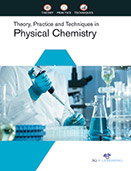Chemistry

Physical chemistry is concerned with the physical basis of chemical occurrences. It lies at the interface of chemistry and physics, inasmuch as it draws on the principles of physics to account for the phenomena of chemistry. This goal is followed through the intensive efforts of experimentalists and theorists. While experimentalists design and carry out laboratory investigations of chemical systems, theorists consider and develop theoretical tools to elucidate and envisage system properties. Chemistry has achieved the status of the central science since it deals explicitly with the molecularity of the world. Everything in the world—from material objects to the storage of thoughts in the human mind has a molecular basis. Thus, it should not be surprising that, as mankind faces problems, whether they be practical ones or those associated with subjects that are key to understanding the development of basic ideas in ancillary and associated disciplines, solutions arise from considerations of molecular-level arguments; in other words, from the application of core chemical principles. Physical chemistry is an essential component of the interpretation of the techniques of investigation and their findings, particularly because these techniques are becoming ever more sophisticated and because their full potential can be realized only by strong theoretical backing. Physical chemistry also has an essential role to play in the understanding of the complex processes and molecules characteristic of biological systems and modern materials.
This book “Theory, Practice and Techniques in Physical Chemistry” illustrates the link between the theory and practice of physical chemistry. The text delivers the fundamental scientific tools to examine systems of interest in a wide range of disciplines, including engineering and biology. It investigates how molecules or atoms combine to form particular molecules. We can also learn about the different properties of matter, such as why a compound burns or about its ability to convert from a liquid to solid substance. Undoubtedly, this field is very important in the world of science, especially as it paves the way for the discovery of new theories. Theories are proposed explanations of what may be occurring in our world using scientific methods. For example, a theory may attempt to explain why certain atoms in a molecule behave a certain way. A comprehensive text as it fulfils the twin requirements of physical pharmacy students: the authentic text on theoretical concepts and its application.